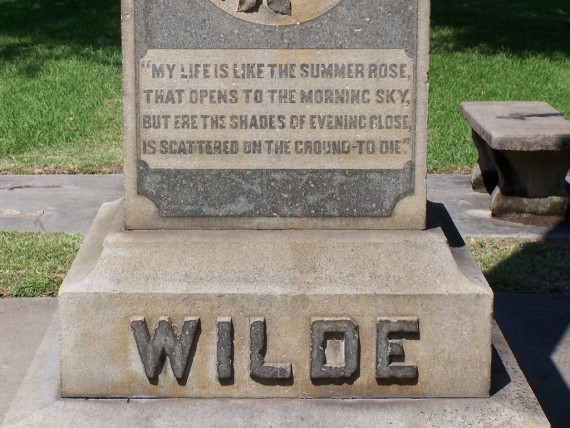Richard Henry Wilde (1789-1847) was regarded as one of the finest American poets of his day. Born in Ireland, he settled in Georgia and served several terms in the United States House of Representatives as a Democratic-Republican and later Jacksonian Democrat. He supported William H. Crawford for president in 1824. Wilde left the United States for Europe in 1835 then returned in 1843 where he resided in New Orleans and served as professor of law at Tulane University.
Lord Byron called Wilde’s “My Life is Like the Summer Rose” (printed below) the best poem to come from the United States. Wilde was truly a Renaissance Man; a gifted poet, student of law, and astute social and political critic. Also printed below is a letter he wrote after the disputed and corrupt election of John Quincy Adams in 1824. To Wilde, it was already clear that the South was “the Ireland of the Union” and that the game was rigged in Washington D.C. The two parties were in fact one with the sole object of enriching themselves at the expense of the Constitution. Shortly before Wilde penned this letter, Thomas Jefferson had written to Crawford that:
I confess that what we have seen in the course of this election has very much dampened the confidence I had hitherto reposed in the discretion of my fellow citizens. The ignorance of character, the personal partialities, and the inattention to the qualifications which ought to have guided their choice, augur ill of the wisdom of our future cause. Looking, too, to congress, my hopes are not strengthened. A decided majority there seem to measure their powers only by what they may think, or pretend to think, for the general welfare of the states. All limitations, therefore, are prostrated, and the general welfare in name but consolidation in effect, is now the principle of every department of the Government.
There was a time when Southern statesmen were giants among men, graced with quality of intellect unsurpassed by the modern political class. Crawford, Jefferson, and Wilde fit that description.
My Life is Like the Summer Rose
MY life is like the summer rose,
That opens to the morning sky,
But, ere the shades of evening close,
Is scattered on the ground—to die!
Yet on the rose’s humble bed
The sweetest dews of night are shed,
As if she wept the waste to see—
But none shall weep a tear for me!
My life is like the autumn leaf
That trembles in the moon’s pale ray:
Its hold is frail—its date is brief,
Restless—and soon to pass away!
Yet, ere that leaf shall fall and fade,
The parent tree will mourn its shade,
The winds bewail the leafless tree—
But none shall breathe a sigh for me!
My life is like the prints, which feet
Have left on Tampa’s desert strand;
Soon as the rising tide shall beat,
All trace will vanish from the sand;
Yet, as if grieving to efface
All vestige of the human race,
On that lone shore loud moans the sea—
But none, alas! shall mourn for me!
Wilde to General David Blackshear, 1825
“From what you have already heard you may well imagine we have fallen on evil times. There is no hope for the Republic during the next four years; if it outlives that time, and has strength enough remaining to shake off its doctors and its diseases its constitution may be restored. But I have my doubts. So insensible to everything but the promotion of their own selfish views of interest or ambition are many of our public men of the present time, so open and unblushing the traffic in influence which we have seen established, that either they must be signally punished, or the people will lose—nay, must have already lost all belief in political honesty, and consider all difference of party as a mere pretext to cover the struggle for office between out and ins.
The coalition-ministry is not yet certainly announced. Clay will be Secretary of State; Mr. Cheves of the Treasury, if he will accept. Mr. Wirt and Mr. Southard, it is thought, will be retained. Mr. Webster must be in some way provided for; but how, is the difficulty. The holy political alliance are afraid of bringing so decided a Federalist into office. He would like to be Speaker of the House, into which Mr. Adams’ friends cannot put him. Forsyth, or McLane of Delaware, will be in his way. This much is certain: let the materials be compounded as they may, we have nothing to hope from the General Government. Our claims for militia services and for the removal of the Indians are not treated with common decency. A refusal to do us justice is accompanied with a careless contempt of our rights, and of the obligations of the Union to us, such as no man would use who had the least regard for the reputation of this Government….
The Southern States are already the Ireland of the Union. I pray God that ere long we may not realize all the bitter consequences of the policy which has made us so.”







